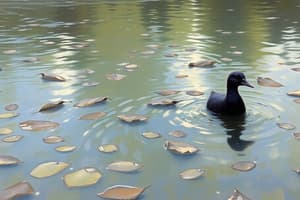Podcast
Questions and Answers
What percentage of the world's freshwater does Canada hold?
What percentage of the world's freshwater does Canada hold?
- 10%
- 20% (correct)
- 30%
- 50%
What is the top of the groundwater zone commonly referred to as?
What is the top of the groundwater zone commonly referred to as?
- Aquifer
- Water table (correct)
- Zone of saturation
- Surface runoff
Which process replenishes aquifers naturally?
Which process replenishes aquifers naturally?
- Natural recharge (correct)
- Groundwater depletion
- Lateral recharge
- Surface runoff
What is the process by which water flows across the land surface into bodies of water called?
What is the process by which water flows across the land surface into bodies of water called?
What constitutes a watershed or drainage basin?
What constitutes a watershed or drainage basin?
What percentage of the world's reliable runoff is currently being withdrawn for human use?
What percentage of the world's reliable runoff is currently being withdrawn for human use?
Which sector uses the largest portion of the water withdrawn each year?
Which sector uses the largest portion of the water withdrawn each year?
What phenomenon causes a loss of two-thirds of the annual surface runoff in rivers and streams according to hydrologists?
What phenomenon causes a loss of two-thirds of the annual surface runoff in rivers and streams according to hydrologists?
What percentage of the Earth's freshwater is readily available for use?
What percentage of the Earth's freshwater is readily available for use?
How does excessive withdrawal of water from natural sources affect the environment?
How does excessive withdrawal of water from natural sources affect the environment?
Why is access to freshwater considered a global health issue?
Why is access to freshwater considered a global health issue?
What is the hydrologic cycle primarily driven by?
What is the hydrologic cycle primarily driven by?
What major consequence arises from altering precipitation patterns?
What major consequence arises from altering precipitation patterns?
Which groups are typically responsible for water collection in developing countries?
Which groups are typically responsible for water collection in developing countries?
What issue arises due to unequal distribution of freshwater resources?
What issue arises due to unequal distribution of freshwater resources?
What critical factor contributes to the threats against the world's freshwater supply?
What critical factor contributes to the threats against the world's freshwater supply?
What can result from groundwater overdrafts near coastal areas?
What can result from groundwater overdrafts near coastal areas?
Which of the following is a major concern regarding tapping deep aquifers?
Which of the following is a major concern regarding tapping deep aquifers?
What advantage do large dams and reservoirs provide?
What advantage do large dams and reservoirs provide?
What is one negative effect of building large dams?
What is one negative effect of building large dams?
Why might the costs of tapping deep aquifers be concerning?
Why might the costs of tapping deep aquifers be concerning?
What can happen to reservoirs over time?
What can happen to reservoirs over time?
What percentage has the construction of large dams increased annual reliable runoff available for human use?
What percentage has the construction of large dams increased annual reliable runoff available for human use?
What ecological consequence can arise from the flooding caused by dams?
What ecological consequence can arise from the flooding caused by dams?
What is one advantage of large dams and reservoirs?
What is one advantage of large dams and reservoirs?
Which of the following is a disadvantage associated with water transfers?
Which of the following is a disadvantage associated with water transfers?
What is a significant risk of large dams?
What is a significant risk of large dams?
Which process uses high pressure to remove salt from water?
Which process uses high pressure to remove salt from water?
What is a major concern regarding the process of desalination?
What is a major concern regarding the process of desalination?
Why can removing salt from seawater be considered costly?
Why can removing salt from seawater be considered costly?
What is one environmental consequence of large dams?
What is one environmental consequence of large dams?
What is a consequence of water transfer for agriculture?
What is a consequence of water transfer for agriculture?
What is a major environmental drawback of desalination?
What is a major environmental drawback of desalination?
What is the most efficient irrigation method mentioned for delivering water to crops?
What is the most efficient irrigation method mentioned for delivering water to crops?
What contributes significantly to freshwater waste in irrigation?
What contributes significantly to freshwater waste in irrigation?
Which of the following industries consumes almost 90% of the water used by industry in the United States?
Which of the following industries consumes almost 90% of the water used by industry in the United States?
What is a common cause of water loss in major cities of less-developed countries?
What is a common cause of water loss in major cities of less-developed countries?
What is the largest use of domestic water in the US?
What is the largest use of domestic water in the US?
Which factor is a reason for the excessive waste of freshwater?
Which factor is a reason for the excessive waste of freshwater?
What is suggested as a high government priority to reduce freshwater waste?
What is suggested as a high government priority to reduce freshwater waste?
Flashcards are hidden until you start studying
Study Notes
Freshwater: A Scarce & Irreplaceable Resource
- Freshwater is relatively pure with few dissolved salts.
- Although about 71% of the Earth's surface is covered in water, most is saltwater.
- Less than 0.024% of Earth's freshwater is readily available for human use.
- Most of the world's freshwater is locked in salty oceans, frozen polar ice caps and glaciers, or deep underground in inaccessible locations.
- Freshwater is essential for life, with a person able to survive weeks without food but only a few days without water.
- The hydrologic cycle, driven by solar energy and gravity, continuously collects, purifies, recycles, and distributes freshwater.
Threats to Freshwater Supply
- Water pollution can overload the hydrologic cycle, hindering its natural purification process.
- Over-extraction of water from underground and surface sources can deplete supplies faster than they are replenished.
- Climate change disrupts long-term precipitation patterns and affects freshwater distribution.
Uneven Distribution of Freshwater
- The distribution of freshwater varies considerably across the globe due to rainfall patterns and economic resources.
- Some regions are water-rich while others are water-scarce, creating disparities between water "haves" and "have-nots."
Groundwater and Surface Water: Essential Sources
- Groundwater originates from precipitation that infiltrates the ground and percolates through soil, gravel, and rock until reaching an impenetrable layer.
- The zone of saturation, where spaces are completely filled with water, is located above the water table.
- Aquifers are underground layers of sand, gravel, or bedrock where groundwater flows, typically moving very slowly.
- Aquifers are replenished through natural recharge from precipitation and lateral recharge from lakes, rivers, and streams.
- Surface water refers to freshwater from precipitation and snowmelt that flows across the land surface into various water bodies.
- Surface runoff occurs when precipitation does not infiltrate the ground or evaporate.
- A watershed, or drainage basin, is the land area from which surface water drains into a specific water body.
Human Consumption of Freshwater
- Only one-third of the annual surface runoff in rivers and streams is considered reliable and available for human use.
- Human population growth tripled during the 20th century, leading to a sevenfold increase in global water withdrawals and a four-fold increase in per capita withdrawals.
- We currently withdraw about 34% of the world's reliable freshwater runoff.
Water Uses and Its Impact
- The majority of freshwater withdrawals (70%) are for irrigating crops. Industry accounts for 20% and residences for 10%.
- Excessive groundwater withdrawals can lead to:
- Land subsidence, causing damage to infrastructure.
- Saltwater intrusion into freshwater aquifers, rendering water undrinkable.
Deep Aquifers: Opportunities and Concerns
- Deep water aquifers hold vast freshwater reserves potentially sufficient for centuries.
- However, tapping these ancient deposits presents four major concerns:
- They are nonrenewable and cannot be replenished on a human timescale.
- The ecological and geological impacts of pumping from deep aquifers are largely unknown.
- International treaties governing shared deep aquifers are lacking, potentially leading to conflicts.
- The high cost of tapping deep aquifers remains uncertain.
Managing Water Depletion
- Solutions for groundwater depletion include:
- Building more dams to store water and generate hydroelectricity.
- Transferring water between locations, though this can be wasteful and harm ecosystems.
- Desalination, which involves removing salt from seawater but has associated costs, environmental impacts, and produces briny wastewater.
Reducing Freshwater Waste
- Various strategies can help reduce freshwater waste:
- Eliminating government subsidies for freshwater, encouraging efficient use.
- Implementing efficient irrigation techniques, including drip irrigation, to minimize water loss.
- Redesigning industrial processes to reduce water consumption.
- Fixing leaks in domestic and industrial water systems to prevent unnecessary water loss.
Key Benefits of Reducing Freshwater Waste
- Reduced waste leads to increased water availability, promoting sustainable use and reducing the need for resource-intensive solutions like desalination or water transfers.
- Freshwater conservation also plays a crucial role in protecting ecosystems and mitigating the ecological impacts of water scarcity.
Studying That Suits You
Use AI to generate personalized quizzes and flashcards to suit your learning preferences.




